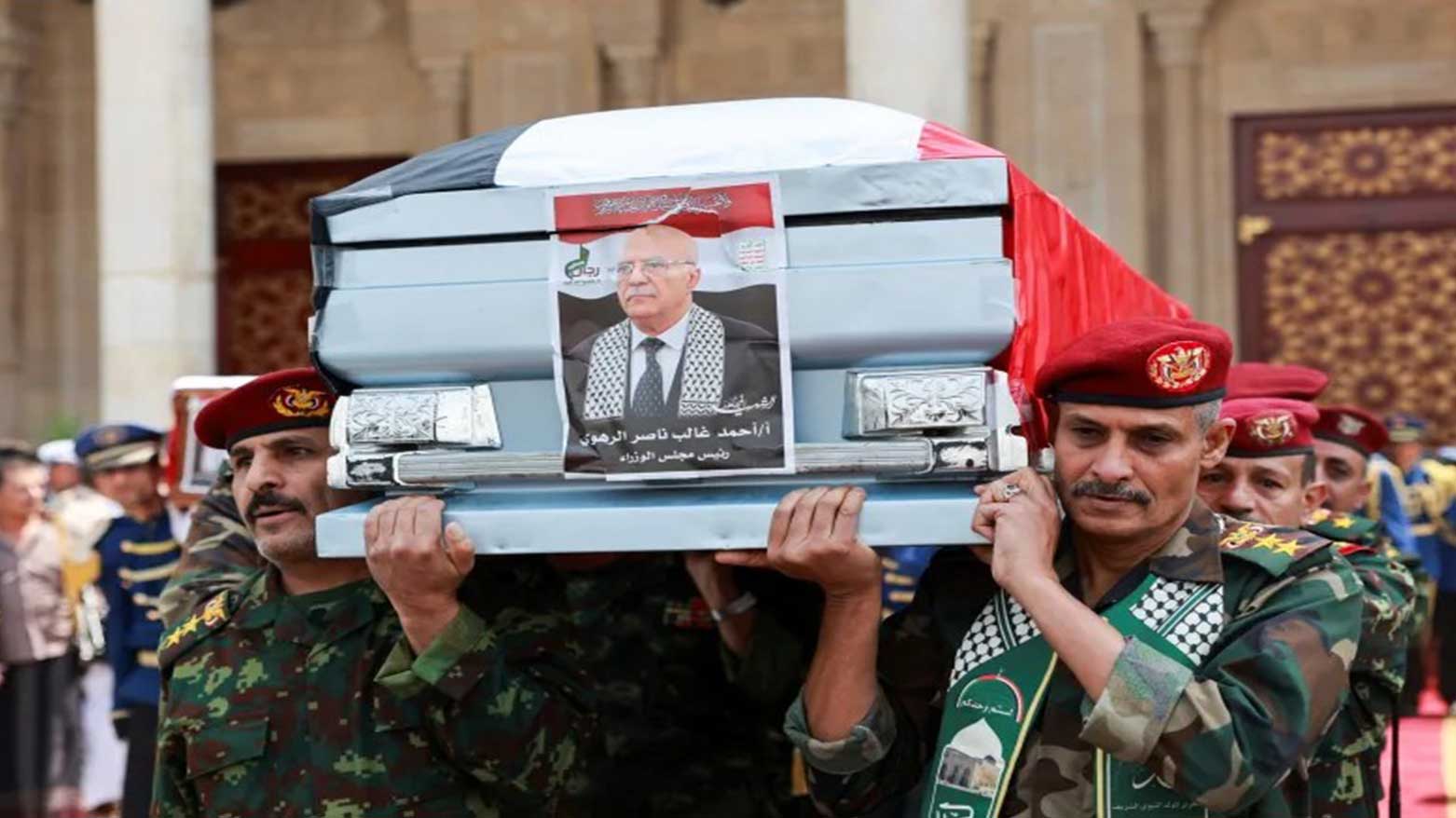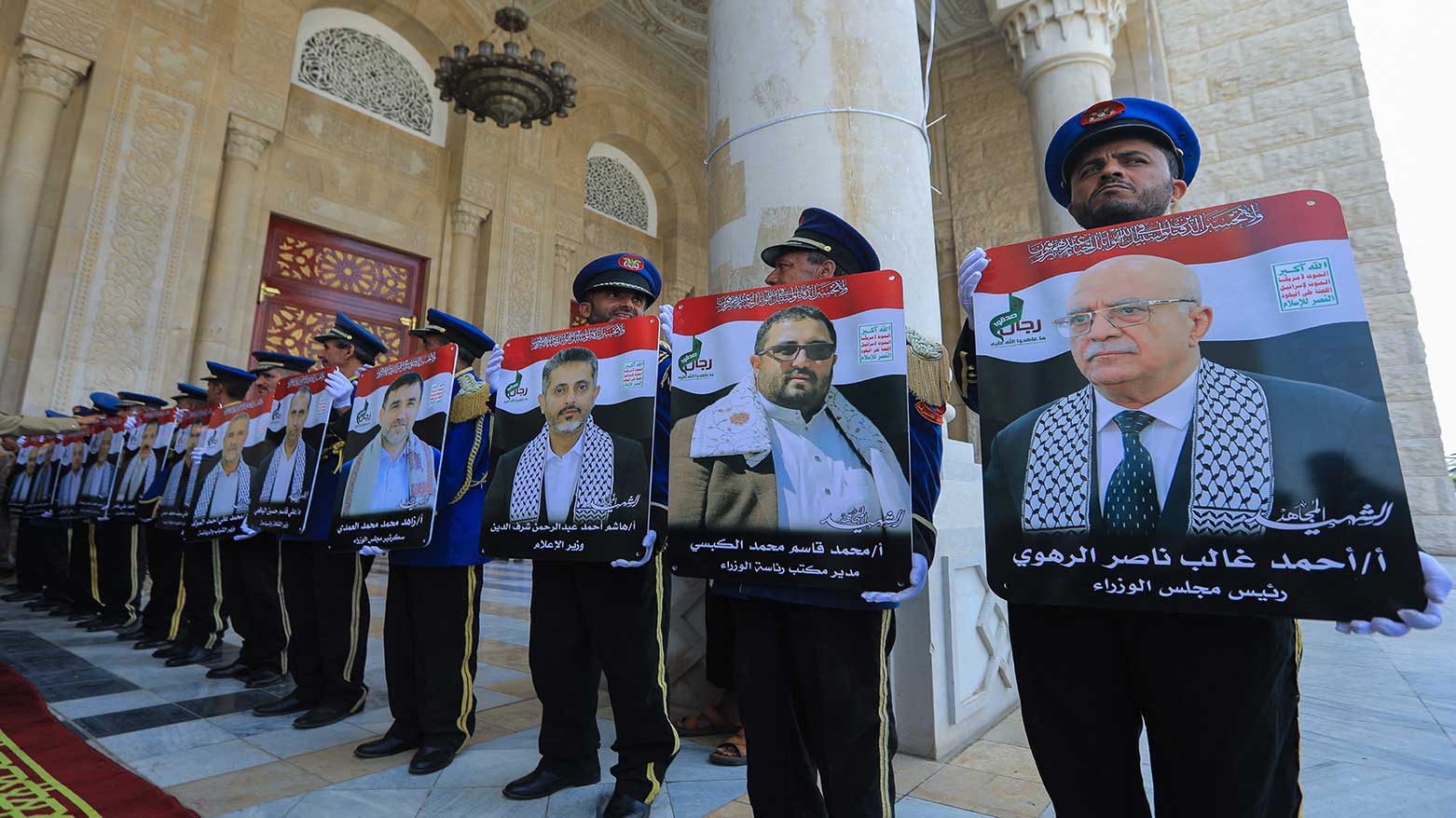Yemen’s Huthi Rebels Hold Funeral for Prime Minister and Senior Officials Killed in Israeli Airstrike
Israeli strike wipes out half of Houthi cabinet as thousands join funeral in Sanaa, while rebels vow intensified attacks on Israel and Red Sea shipping amid rising regional tensions.

ERBIL (Kurdistan24) — Yemen’s Huthi rebels held a funeral on Monday for their prime minister and 11 other senior officials killed in an Israeli airstrike that struck the Iran-backed group’s leadership.
Twelve coffins draped in flags were displayed at Sanaa’s Al-Shaab Mosque as masked gunmen patrolled the area and thousands of mourners gathered to pay their respects. Among the deceased was Houthi Prime Minister Ahmed Ghaleb Nasser al-Rahawi, along with nine ministers and two cabinet officials, who were killed while attending a government meeting near Sanaa on Thursday.
The strike marked the highest-profile assassination in months of Israeli operations against the Houthis during the ongoing Gaza war. The United States also conducted an intensive bombing campaign against Houthi targets from March to May this year.
The attack has escalated tensions in the region. On Sunday, Houthi authorities detained at least 11 United Nations staff members in a round-up that prompted a protest from UN Secretary-General António Guterres.
A Yemeni security source told AFP that dozens of people were arrested in Sanaa and other areas “on suspicion of collaborating with Israel.”
The Houthis also launched a missile at the Israeli-linked Liberian-flagged tanker Scarlet Ray in the Red Sea on Sunday, part of a campaign they have maintained throughout the Gaza conflict. The missile reportedly landed close to the vessel with a “loud bang,” according to the UK Maritime Trade Operations monitoring agency.
The Houthis, part of Iran’s “axis of resistance” of anti-Israeli groups, vowed to intensify attacks on Israel following Thursday’s killings. The group has fired missiles and drones at Israel and commercial shipping in the Red Sea, a key global cargo route, claiming solidarity with the Palestinians.
Last week’s Israeli strike eliminated about half of the 22-member Houthi cabinet, which primarily holds administrative responsibilities. Prime Minister al-Rahawi hailed from the southern province of Abyan, outside the main areas of Houthi control.
Historically, the Houthis have reserved the premiership for southerners to consolidate political support and win hearts and minds.
US-based Yemen analyst Mohammed Al Basha described Thursday’s strike as a potential shift toward targeted killings, an approach Israel has used against Hamas in Gaza and Hezbollah in Lebanon.
He suggested the attack could mark “the beginning of a campaign of targeted assassinations against both civilian and military Houthi leadership, even at informal gatherings,” calling it a “bad day” for the group.
The strike and its aftermath underscore the growing volatility in Yemen, as the Houthis continue to assert themselves militarily while regional powers grapple with the broader implications of the Gaza war and Red Sea security.
Iran’s top diplomat, Foreign Minister Abbas Araghchi, on Monday, strongly condemned Israel’s recent airstrike on Sana’a that killed several top Yemeni officials, including Prime Minister al-Rahawi, describing it as a “cowardly” and unprecedented act of aggression against a sovereign nation.
Araghchi framed the attack as a blatant violation of Yemen’s national sovereignty and territorial integrity, branding it a heinous crime that strikes at the heart of a proud and freedom-loving nation. In his statement, he emphasized Yemen’s role over the past two years as a steadfast supporter and defender of the Palestinian people, highlighting the country’s historical commitment to opposing oppression in the region.
The Iranian foreign minister also extended his condolences to the people of Yemen and Palestine, as well as to Muslims and freedom-seekers worldwide, decrying the act as a symbol of escalating violence in West Asia.
According to Araghchi, the international community’s failure to respond decisively—particularly the continued inaction of the United Nations and the support provided by the United States and some Western countries, including Britain—has emboldened Israel’s aggressive actions.
He argued that this complicity seriously undermines the credibility of international law and highlights the growing impunity of states violating global norms.
Araghchi warned that the assassination of the Yemeni leadership represents an unprecedented threat not only to regional peace but also to international security as a whole. He described the situation as an existential danger to humanity, calling on countries across the globe to take urgent and effective measures to halt ongoing atrocities in Gaza and to hold Israeli officials accountable.
The Iranian diplomat framed these acts of violence as part of a broader pattern of systematic aggression that demands immediate action from both regional powers and the international community.
Finally, Araghchi asserted that Israel’s targeted killings would not weaken the Yemeni people’s resolve. Instead, he insisted, the airstrike will reinforce Yemen’s determination to defend its dignity, independence, and ongoing support for the Palestinian cause.
Far from intimidating Yemen or its allies, the act, he said, will serve as a catalyst for strengthening resistance movements against Israeli aggression throughout the region, underscoring the resilience of communities standing against oppression and foreign intervention.
